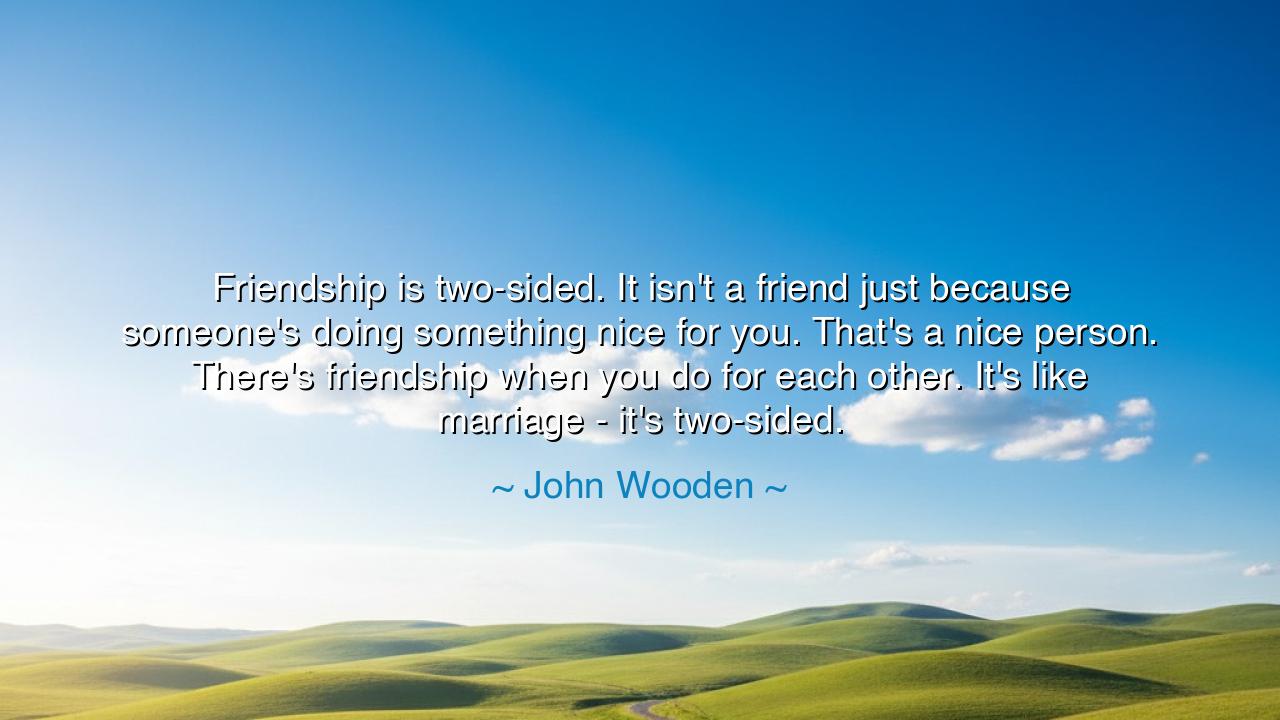
Friendship is two-sided. It isn't a friend just because someone's
Friendship is two-sided. It isn't a friend just because someone's doing something nice for you. That's a nice person. There's friendship when you do for each other. It's like marriage - it's two-sided.






In the wise and steady words of John Wooden, a teacher not only of sport but of life itself, we find a truth of enduring depth: “Friendship is two-sided. It isn’t a friend just because someone’s doing something nice for you. That’s a nice person. There’s friendship when you do for each other. It’s like marriage – it’s two-sided.” Here, the great coach reminds us that friendship, like all sacred bonds, must be reciprocal — built upon the balance of giving and receiving. A friendship that flows only one way is not truly friendship but charity; only when two souls invest in one another, lifting and sustaining together, does the bond become unbreakable.
Wooden’s wisdom was born from a life shaped by integrity and service. Known as the “Wizard of Westwood,” he was more than a basketball coach — he was a philosopher of virtue. He believed that greatness, whether in sport or in spirit, could not exist without character and loyalty. In his own life, Wooden lived what he taught. His marriage to his beloved Nellie, which endured for over half a century until her passing, was the living image of the truth he speaks here. Even in her absence, he wrote her a love letter every month, a ritual of devotion that showed his understanding that love and friendship are living acts, not mere feelings. To Wooden, both marriage and friendship required two hearts giving freely, without keeping score.
The ancients, too, knew that mutuality was the essence of all noble relationships. Aristotle, in his Nicomachean Ethics, wrote that friendship exists when two people wish good for one another for the other’s sake — not for advantage, nor for pleasure, but for shared virtue. This, he said, is the rarest and highest form of love, the kind that endures time and trial. Wooden’s words echo this same philosophy: that to call someone a friend is to enter a covenant of balance, where kindness is not an occasional favor but a rhythm of mutual care.
Consider the example of Damon and Pythias, those legendary friends of ancient Syracuse. When Pythias was condemned to die, he begged to visit his family before the execution. Damon offered himself as hostage in his place, promising that his friend would return. The tyrant laughed, believing betrayal certain. Yet Pythias returned as promised, choosing honor over safety. The king, humbled by their loyalty, spared them both. In that story lives the essence of Wooden’s teaching — that true friendship is two-sided, a shared courage, a mutual faith, each willing to bear the burden for the other.
Wooden warns us gently against mistaking kindness for friendship. A person may do good deeds for another, but without reciprocity — without the will to give back in spirit, loyalty, or compassion — there is no living bond. True friendship is not built on favors, but on mutual devotion. It is not the one who gives much or the one who receives much who is called a friend, but both who share equally in the exchange of trust. Just as a marriage cannot thrive when only one heart beats for two, friendship cannot endure when only one hand reaches across the divide.
This wisdom is especially urgent in our modern age, where relationships too often become transactions — one-sided exchanges of convenience, attention, or benefit. Wooden calls us back to the ancient truth: that to be a friend is to serve and to be served, to love and to be loved. The highest joy of friendship lies not in what one gains, but in the harmony of two lives intertwined through loyalty, sacrifice, and shared joy. Such friendship is a fortress against loneliness and despair — a quiet miracle born from the daily act of giving.
So let the lesson of John Wooden be written upon the hearts of all who hear it: if you would have friends, be a friend. Give not only your time, but your faith, your listening ear, your forgiveness. Do not wait to receive before you offer; do not measure what you give against what you get. Friendship, like marriage, is sustained by reciprocity, by the constant renewal of trust.
And remember, dear listener, that in this balance lies one of life’s greatest treasures. A friendship where each gives and each receives becomes a sanctuary of the soul, a bond that no storm can break. Live, then, as the wise coach taught — not as one who waits to be loved, but as one who loves first. For when friendship is truly two-sided, it becomes the greatest comfort, the deepest strength, and the purest joy this mortal life can know.






AAdministratorAdministrator
Welcome, honored guests. Please leave a comment, we will respond soon